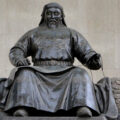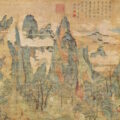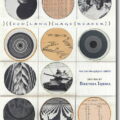Failing to Make : Out of Absence : Toward Poiesis

“And so, as I sleep, some dream beguiles me, and suddenly I know I am dreaming. Then I think: this is a dream, a pure diversion of my will; and now that I have unlimited power, I am going to cause a tiger.
Oh, incompetence! Never can my dreams engender the wild beast I long for. The tiger indeed appears, but stuffed or flimsy, or with impure variations of shape, or of an implausible size, or all too fleeting, or with a touch of the dog or the bird.”
—from “Dreamtigers,” by Jorge Luis Borges, translated by Mildred Boyer
:
I first read “Dreamtigers” when I was seventeen, stumbling through the labyrinths of Borges with four years of Spanish study, a dictionary, and a copy of Mildred Boyer’s translation. I felt such kinship with his lament—“Never can my dreams engender the wild beast I long for.” In my own lucid dreams, I always tried to fly, and though I could launch myself upward, my flights were labored, ungainly, limbs flailing like a bad swimmer as I struggled to gain altitude. The Earth’s pull was too strong for me, even when only imagined. More importantly, his acknowledgment of failure in a space of unlimited power felt like an articulation of my own struggles to write poetry, the dissonance between the pure potential of words and the reality of what I made with them. His failures at least were still evocative. I could see those flawed beasts: the stuffed tiger, the imperfectly sized, the bird-like.
“Dreamtigers” comes from the collection El Hacedor, which translates into “The Maker.” In the title piece, Borges offers a brief portrait of Homer. Memory and language mean little to him until after he goes blind. Only “in this night of his mortal eyes” does he hear “the murmur of the Odysseys and Iliads it was his destiny to sing and leave echoing concavely in the memory of man.” Homer is never mentioned by name—we know his identity only by his works. Borges continually imagines him descending: down “the rough hillside,” “in this night of his mortal eyes,” “into his memory.” The master maker must descend before he can create. Out of loss, out of dark depths, a wellspring of Western poetry, until “he descended into the last shade of all.”
What I did not know when I first encountered his work was that Borges himself went blind. When “El Hacedor” was published in 1960, he had already experienced “a slow nightfall” and passed “the pathetic moment…when I knew I had lost my sight, my reader’s and writer’s sight” as he relays in his 1977 lecture “Blindness.” But colors stayed with him, blue, green, and particularly yellow: “I remember when I was young I used to linger in front of certain cages in the Palermo zoo: the cages of the tigers and leopards. I lingered before the tigers’ gold and black. Yellow is still with me, even now.” The lamentation of the speaker in “Dreamtigers” goes beyond frustration that he can’t control his dreams or a metaphor for writerly dissatisfaction; for the Borges behind the speaker (the veil between them seems especially thin here), dream was the only place he could see his beloved tigers, or see any forms at all.
:
I am still not the best maker of poems.
Writing has always been laborious for me, necessary, pleasurable, but usually slow and difficult going. Aside from occasional flurries of poems, before a deadline here, a 30/30 poem challenge there, I have never been a prolific writer. So often I have resolved to follow the precept “nulla dies sine linea”—no day without a line—yet I have never been able to sustain it for more than a month or two before missing a day and then inevitably more.
What does it mean when you are not producing poems? Are you still a poet?
:
In The Man Without Content, Giorgio Agamben describes the Greek distinction “between poiesis (poiein, “to pro-duce” in the sense of bringing into being) and praxis (prattein, “to do” in the sense of acting). “[C]entral to praxis was the idea of the will that finds its immediate expression in an act, while, by contrast, central to poiesis was the experience of pro-duction into presence, the fact that something passed from nonbeing to being, from concealment into the full light of the work.” It is “a mode of truth understood as unveiling, ἀ-λήθεια” which Derek H. Whitehead further explicates as “a-letheia, a making known which pro-duces or leads things into presence” in his essay “Poiesis and Art-Making: A Way of Letting-Be.”
If I am not producing poetry, perhaps I can still try practicing poetry. However, what would a poetry practice, will in action, look like? It’s not as clear as, say, practicing the piano, which I know well. How to read music, to hold my body, to press the keys. How to study musical structure, learn each hand separately, drill for technical proficiency. How to feel and interpret the music, how to breathe to find its shape. Perhaps it isn’t so different after all. To read poems. To feel how words move through my body, to arrange them differently. To study poetic craft, to handle different voices, to try different forms. To feel the shape of the words, the lines, through my breath.
A practice of poetry would hopefully bring me closer to actual making. If poiesis is to lead a thing into presence, then practice could provide approaches toward the thing. The wild animal, hidden in the bushes. Sometimes plowing straight ahead (“Now I shall write a poem!”) works, sometimes coming in at a slant (“Let’s read Hopkins and be carried away by his word-music”) is more effective. But the wild thing can still elude us. We may will a thing with all our power and still fail to bring it into existence. What then?
:
In Korea, a dream of tigers, snakes, pigs, dragons, other large animals, hot peppers, or chestnuts heralds the birth of a boy. A dream of jewelry, fruit, flowers, deer, fish, or other small animals or pretty things signifies the birth of a girl. A kind of making known.
The mother may not be the dreamer. Other family members or close friends may receive the dream. For instance, my grandmother dreamed of traveling to Donghaksa, a Buddhist temple, and encountering three beautiful tiger cubs along the way. She chose the two prettiest and gave them to my mother. While a tiger would normally signify a boy, the cubs’ delicacy and beauty were unmistakably feminine. And my mother had two girls.
During one of my pregnancies—I can’t remember which—I dreamed of a kitten. Eyes sealed shut, the tiny thing mewled piteously as it moved feebly in my cupped hands. After a few moments, its fur started falling out; it grew smaller, floppier, disintegrating until all I had left was a handful of white flesh falling off bone, like meat left to boil too long.
:
I am not the best maker of babies.
I was thirty-one when I got pregnant for the first time. Seven weeks in, only one week after the positive pregnancy test, I started bleeding. Ultrasound showed a gestational sac, but partly collapsed, and no embryonic pole.
When you miscarry, you have three choices. One: wait for your body to pass the “retained products of conception” on its own. Two: take misoprostol, used to induce labor, to get the body to expel things more quickly. Three: a D&C. Dilation and curettage. The cervix is dilated, then the uterus is gently scraped with an instrument called a curette.
I had a missed miscarriage. Not only could I not carry a baby to term, I couldn’t even miscarry properly. Two weeks of waiting. A dose of misoprostol, followed by hours of painful cramping and bleeding, but not enough. Another dose of misoprostol, more bleeding and cramping. Considering, then rejecting the D&C. Waiting again. It was eight long weeks before I was finally empty and could try again.
I was still thirty-one when I had my second miscarriage. Six weeks along when I started bleeding again, this time painlessly, for a week. Almost like a regular period. At least I was better at miscarrying—I’d been practicing, after all. Approaching a little closer.
What does it mean when you’ve been pregnant twice but haven’t given birth? Are you still a mother?
:
She was in herself, like a woman near term,
and did not think of the man, going on ahead,
or the path, climbing upwards towards life.
She was in herself. And her being-dead
filled her with abundance.
As a fruit with sweetness and darkness,
so she was full with her vast death,
that was so new, she comprehended nothing.—from “Orpheus. Eurydice. Hermes,” by Rainer Maria Rilke, translated by A.S. Kline
:
Most renderings of this myth focus on Orpheus, his grief, how his immense powers of poetry and music soften the heart of Hades and earn him the chance to bring his wife back from the Underworld. This could be seen as attempted poiesis, to descend and then bring her from the obscuring “concealment” of death “into the full light,” to lead a thing into presence. Eurydice herself, however, is usually effaced, an object of desire but of no real substance. Perhaps this is in part because of the admonition to Orpheus to not look back, and we too dare not look upon her.
But in this poem, Rilke not only allows but insists that we see Eurydice in all her strange glory. Never bearing children in life, she nonetheless achieves a kind of pregnancy with her own death. “She was in herself” so utterly that there is no comprehension or space for Orpheus. That fullness, so richly rendered—elsewhere the speaker tells us “She was already loosened like long hair, / poured out like fallen rain, / shared like a hundredfold supply. // She was already root”—makes her seem non-human, unreachable and strange. While she is emptied out, that emptiness is the fullness of death, somehow ripe and rooted.
The tension between this language of fecundity and that of death has long stayed with me, like a riddle or a kōan—fifteen years ago, I wrote, “How can deadness fill one like a fruit?” But after my miscarriages, I suddenly realize the metaphorical has become literal. I have been pregnant with death, not my own death but a death in myself. The loss of a physical part of me, infinitely near and dear yet separate. Like Orpheus, I tried to lead my beloved ones into presence, but failed. Unlike him, I broke no conditions, but then there was never an agreement with the gods in the first place. Only expectation and longing.
:
To lead into presence presupposes absence. We long for what we lack, not what we have, and strive to engender what is missing. Absence does not have to involve loss, but loss makes absence palpable and insistent, demanding some kind of response. For Orpheus, losing Eurydice brings out the height of his poetic abilities and the chance to retrieve her, yet the very longing that drives him also causes him to look back and lose her forever.
For the maker of Borges’s imagination, blindness is a necessary precursor to the Odyssey and the Iliad. For himself, Borges declares, “I owe to the darkness some gifts: the gift of Anglo-Saxon, my limited knowledge of Icelandic, the joy of so many lines of poetry, of so many poems, and of having written another book, entitled, with a certain falsehood, with a certain arrogance, In Praise of Darkness.” Arrogance and falsehood, not normally seen as positive generative forces, allow him to move forward with vigor and resolve. Despite losing his reader’s and writer’s sight, he continues to learn languages, to absorb poetry, and to write.
After my losses, I felt an overwhelming need to write but utterly choked, the words stuck in my body like the retained products of conception during my first miscarriage. 기가 막혔어. “기” is “gi,” more commonly known as chi, the energy of the body, and “막혔어” means “blocked.” The phrase is used when you perceive something shockingly good or bad. It’s as if all the energy in your body freezes momentarily in amazement or disbelief. My words felt paralyzed for months. The absences in my life—no children, no poems either—drained me. I resolved to be happy, my own way of bluffing forward, but I was tired, tired of trying and failing, of exerting my will to no avail. Out of necessity, I let myself go soft, entering into a mindless rather than mindful version of the speaker in D. H. Lawrence’s “Song of a Man Who Has Come Through:”
Not I, not I, but the wind that blows through me!….
If only, most lovely of all, I yield myself and am borrowed
By the fine, fine wind that takes its course though the chaos of the world….
Let me be the one carried, the one borne since I am not carrying or bearing right now. For Lawrence’s speaker, this mode is one of inspiration, toward creation, but for me, for a time, this was a means to simply breathe, to ease my passage through the “chaos of the world.”
:
“What is your original face before your father and your mother were born?”
My grandparents were Buddhist, and while I feel drawn to Buddhism, I know very little. I do know this is a version of a classic kōan, subject of many teachings and commentaries. I don’t know what this means, but I find its phrasing a comfort. The question suggests origin that is separate from birth, which allows for the possibility of motherhood separate from giving birth. I’m probably grossly misinterpreting it from a Buddhist standpoint. Perhaps this is just unnecessary mental gymnastics, me making something out of nothing. I also know there is motherhood by adoption, by surrogacy, by accident, by violence. It seems too simple to say “If you have mother feeling, you are a mother.” It seems too simple to say, “Physically bearing a child doesn’t necessarily make you a mother.” But I suppose simplicity doesn’t make it wrong.
:
I’m no more your mother
Than the cloud that distills a mirror to reflect its own slow
Effacement at the wind’s hand.All night your moth-breath
Flickers among the flat pink roses. I wake to listen:
A far sea moves in my ear.—from “Morning Song,” by Sylvia Plath
:
Six years after my first miscarriage, I have two little ones now, a three-year-old boy and a baby girl approaching her first birthday. Every moment of those pregnancies was a study in nonattachment. To be expecting without expectation. To hold lightly. But I was able to carry them and finally lead them into presence. Yet even now, with my daughter sleeping in my arms as I write this, motherhood feels precarious, provisional. My children are my children, but at the same time they are not mine to possess. I am their mother but sometimes feel emptied, everything being poured out into their care.
This contradiction is partly why I find “Morning Song,” the opening poem of Ariel, Plath’s posthumous collection, so compelling. A sense of irrevocable distance paired with close attentiveness suffuses these stanzas. Not only does the speaker feel no closer claim to “mother” than a cloud, the cloud is doubly diminished. First, “distill[ing] a mirror,” which evokes for me the cloud’s water vapor condensing to rain and creating a pool “to reflect” the second, “its own slow/Effacement at the wind’s hand.” The syntax sets up a grammatical kind of equivalence between the speaker and the cloud, further connected by “effacement,” used to describe the thinning of the cervix which occurs before birth. I also imagine her being worn thin caring for her child, just as I can feel frayed attending to my own children.
In the next lines, she offers a tender observation, how “your moth-breath/Flickers among the flat pink roses,” which I find myself interpreting literally, the baby sleeping on rose-patterned sheets. But when she wakes to listen (what parent has not strained every fiber of their being to make sure their sleeping child is still breathing?), she hears “a far sea,” not a near one. The language that surrounds the child is drawn from the natural world, lovely but also at a remove, a register that continues in the closing lines of the poem:
One cry, and I stumble from bed, cow-heavy and floral
In my Victorian nightgown.
Your mouth opens clean as a cat’s. The window squareWhitens and swallows its dull stars. And now you try
Your handful of notes;
The clear vowels rise like balloons.
As with Rilke’s depiction of Eurydice, Plath’s description of the baby has a sense of foreignness, evoking an Other that resists ownership and understanding, that demands being seen as wholly separate and unknowable. “Your mouth opens clean as a cat’s”—the simile is so clear yet startling, a little uncanny. Indirect references to nursing abound, “cow-heavy,” the open mouth, whitening, yet it is the window that “swallows its dull stars,” not the baby, a kind of metaphoric displacement.
What I see here isn’t cool detachment but bafflement, exhaustion, and a keen sense of life’s transience. The poem begins with “Love set you going like a fat watch,” and in the last stanza, we see the shift from night to day, the steady march of time toward the moment the watch will stop. And yet, the poem ends with a lifting movement as the baby tries a “handful of notes; / The clear vowels rise like balloons.” Against the press of time and the end that awaits us all, we hear the voice of a child through the voice of a poet-mother.
This awareness of our mortality drives the urge to create, to produce, to reproduce. To co-opt one of Maurice Blanchot’s phrases from The Space of Literature, “death’s space” is the essential absence out of which we create. We make against the unmaking of things, the knowledge that the body fails, that everything passes, so that some part of us may endure in our children, in our words, in our art.
:
: :
Obdurate sound. Thereby insert interpret.
Receive materials lumber nails and oats.
Building is a process. Light is an element.
—from Dura, by Myung Mi Kim
:
“Obdurate sound” aptly describes a child’s cry. The phrase also evokes a fundamental aspect of Dura, Kim’s book-length work which resists easy understanding but draws me in with the music and physicality of its language. By using the adjective “obdurate,” Kim turns sound, normally fleeting, into something more stubborn and unyielding. She performs a similar transformation in the next lines. First, we “[r]eceive materials lumber nails and oats.” Then, the parallelism of “Building is a process. Light is an element.” creates a connection between building and light, and by proximity and association, light somehow becomes a material as durable as lumber. At the same time, the process is mysterious; how or what would be built with these materials remains opaque.
Consider also the pair of colons which precedes the text and occur at the top of every page throughout THIRTY AND FIVE BOOKS, the longest section of Dura. A colon declares a relation. A colon is also a breath, a pause. And so I read emptiness relating to emptiness relating to emptiness, with breaths in between. The empty spaces demarcated by the colons are rich with potential; each could be filled with anything. Furthermore, they exist in relation to each other rather than standing alone. Without a using single word, she simultaneously evokes mystery and spaciousness. She makes something out of emptiness.
When Kim does define the spaces, they can brim with nature and sound: “Relate anemone, rock, kelp and sand : summer’s wren, acre and hill.” They also can be rigorous and almost entirely devoid of images:
Propose: constant translation. Propose: the
application of the compass to navigation. Propose: from
a settlement, a capital grows. Propose: foray, expansion.
Propose: as relates to an America. Propose: as relates
to immigrant. Propose: knowledge becomes the parlance
of the state. Propose: sound combinations. Propose:
nameless days.
Here, she uses the colon in a traditional manner, but the anaphoric repetitions of “Propose:” ask us to ponder the relationships of the phrases that follow. I am reminded of analogy problems (compass : navigation :: curette : ________ ) except with more links and complexities. How does a compass connect to expansion, America to immigrant to the parlance of the state? In the next breath, we are reminded all these words and ideas are on one level simply sound combinations. Obdurate sounds. Stubbornly present yet also fleeting.
The word “light” will never be equivalent to the actual light streaming through my window, yet by pointing at the gap between signifier and signified, Kim somehow imbues the word “light” with a different heft and energy. Words may be an imperfect medium, but something still translates, gets carried across (from the Latin, “trans” meaning “across, beyond” and “latus” meaning “borne, carried”). Kim highlights the madeness of language, and while disorienting, her stance allows for the possibility of making something new, not easily understood but reaching for the essence of things.
Reading this sort of work, though rewarding, demands careful attention. Without the comfortable scaffold of narrative, sometimes even imagery, I find myself on the alert, hunting for patterns, echoes, something upon which I can make meaning and understanding. I am often bewildered yet rapt, using all my wits to try to make sense of what I’m perceiving. I know there will be misreading and misunderstanding; the opacity of Kim’s work reminds me that her experience and my experience are discrete but this is the starting point, not the endpoint. We have common threads of feeling and experience as well. All we ever can ever manage is an attempt at understanding, to bridge the ineluctable distance between us. This, I realize, is how I often feel in the presence of my children. Trying to be as open as possible, trying to interpret their cues and wrung out by the effort. Tested and testing at every turn. This is also how I often feel when trying to write poetry. Allow me to belabor the point. This is a poet feeling. This is a mother feeling. This is the feeling of trying to make and make sense, with all my abilities, even as I fail.
:
The fourteenth–century Korean monk Taego offers this advice for contemplating “What is your original face before your father and your mother were born?”:
Come to grips with this [the body’s inevitable decomposition] without
falling into oblivion, thousands and thousands of times. If you are like this without
interruption, then naturally your work will become pure and ripe and your body and mind will be clear and content, like the crisp air of autumn.
The paradox of meditation emerges: we must apply ourselves to the problem with a dedicated will, to practice unceasingly, but the goal is to reach a place where the mind becomes “clear and content”; in other words, to exert will in action until will disappears. Particularly striking is the richness of the emptiness he invokes and the necessity of grappling with mortality, and yet focusing on breath, the energy of life, is often used in meditation. The clarity of “like the crisp air of autumn” is a jolt, sensuous and unexpected. I may not know what my original face is yet, but I know how autumn air feels against my skin, bracing, redolent with harvest but also holding the promise of death and decay. Maybe someday understanding will come to me as clearly and viscerally.
This attentiveness to death also produces an equally powerful attentiveness to life. Considering death draws us down into a chthonic space, but then we emerge into the light, all the more dazzling after the dark. I may not always produce, but I can cultivate a sense of attention and receptivity, my ability to “receive materials.” To lead into presence requires one to be present. Harnessing the tension between will and openness is essential for poiesis as well as meditation. To bear and be borne. If we take poiesis as aletheia, if creation is unveiling and making known, then the implication is the work already exists, is simply hidden. The times of not actively creating, of trying and failing might still be part of poiesis, if we are receiving, paying attention, trying to see the true face of things. These are times of gestation, when we are in the dark, in the dirt. When we are effaced, on the cusp of birth.
I may not always carry to term, but the carrying, however brief, changes me. The times I try to create poems and fail still deepen my understanding of words and the world. The times I carried all my children have left their mark, not only emotionally but also physically. Fetal cells pass to the mother where they can linger for years, a phenomenon called fetal microchimerism after the chimera of Greek myth. Although I miscarried two babies, I likely have physical traces of them in my body, in my blood, my brain, my heart. These cells have even been found to migrate to places of injury; for instance, microchimeric stem cells have been found in the liver tissue of patients with liver damage. I once wrote of the contractions induced by misoprostol that “I need to feel the pain because this is all I will get.” I was wrong.
The dream of language: to make something real with words. To touch truth, a reflection of reality. The language of dream: to make something real with words. To make something true, a new reality. I’m not sure which dream, which language is here. What I do know is this: these are the materials I received. This is what I was able to make of them.
:
dream : O incompetence : loss : making :
not making : an approach : a small thing :
missed : : carried : :
pregnant with death : absent : O carry me :
origin : effaced : vowels rising :
sound : material : breathe : light :
bewildered : mother : poet : to make :
attend death : attendant : life :
ripe : : exert : receive :
: unveil : O : these traces
About Hyejung Kook
Hyejung Kook's poetry is forthcoming in Glass: A Journal of Poetry and has appeared in Verse Daily, Beloit Poetry Journal, Hanging Loose, the Denver Quarterly, and elsewhere. Other works include Flight, a chamber opera libretto commissioned by composer Sarana Chou.





